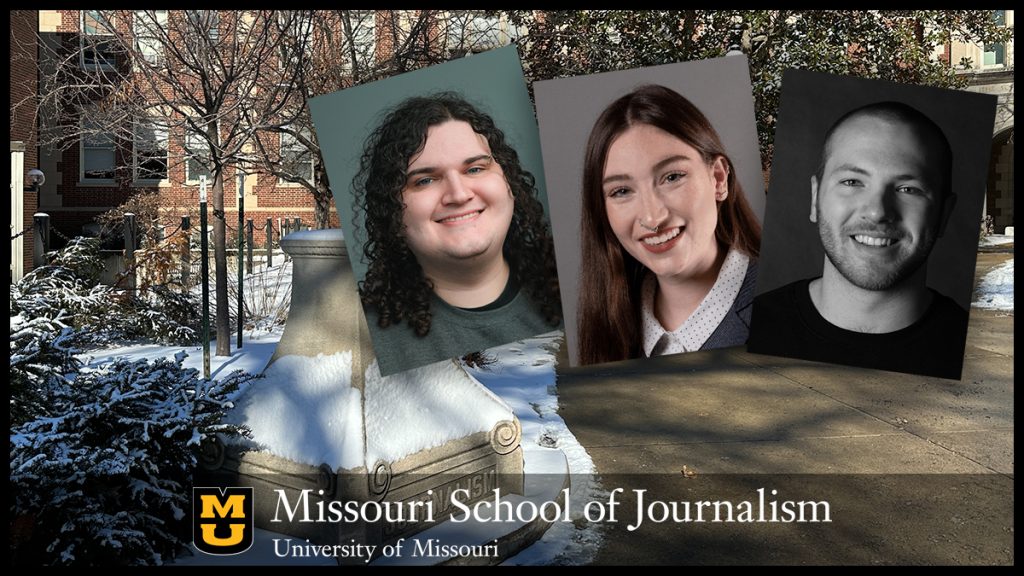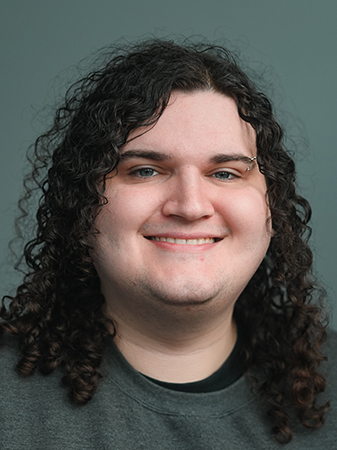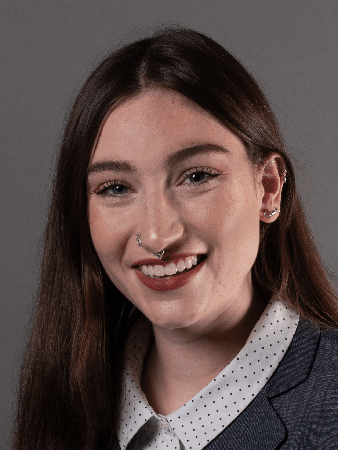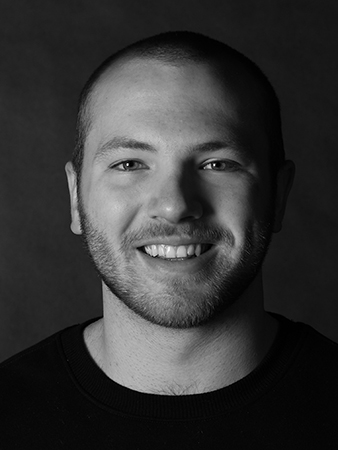Murray Center student film to feature at True/False Film Fest, alums continue to find success

The Missouri School of Journalism’s documentary journalism program is off to a roaring start this year
The Jonathan B. Murray Center for Documentary Journalism has had its share of success stories in its first decade at the Missouri School of Journalism, but 2024 has seen another milestone reached: for the first time, a capstone film from a student in the program has been accepted into the True/False Film Fest, one of the most prestigious documentary film festivals in the country.

“Tilted Arc,” a short film by Baxter Stein, BJ ’23, will be featured in the festival’s shorts program and tells the story of an ill-fated art installation placed in New York’s Federal Plaza in 1981.
“For students to not only work hands-on with documentary filmmaking but have their films showcased at such a high level is outstanding, and I’m sure Baxter will be the first of many to be selected for True/False,” said David Kurpius, dean of the School of Journalism. “This is also a reflection of the quality of education students receive at the Murray Center, which gives them invaluable insights into how the industry works.”
Stein’s maturity as a young filmmaker was praised by Murray Center Filmmaker-in-chief Robert Greene, a working documentary filmmaker and the director of “Procession,” which made the Oscars shortlist for 2022.
“I’m tremendously proud of Baxter,” Greene said. “He had this wealth of archival footage, and it was so fun to see him dive in and make it work in all these different ways.”
Greene added that Stein had originally pitched a completely different film but quickly recognized that he wasn’t ready to make it, an instinct that Greene called “such a great sign of him as a filmmaker.”
But there are other signs, too. In addition to True/False, Stein’s film will also play at the Big Sky Documentary Film Festival in Montana — where it is a finalist for Best Mini-Doc — and at California’s American Documentary and Animation Film Festival.
“It’s weird. There’s a mixture of disbelief, excitement and some nerves,” Stein said. “But I really do like the film that I’ve made, and I’m very proud of it. These festivals are a big deal.”
Stein credited the Murray Center’s support for students both during and after the filmmaking process for encouraging him to give the film a shot on the festival circuit. The center pays for up to four festival submissions, for which entrance fees often range from $35 to $85 or more. Stipends to students for films that require travel or other expenses during production can also be provided.
“The fact that the center goes beyond just teaching you how to make a movie is so cool,” Stein said. “I only applied to five festivals because I didn’t think my movie was going to get in, but when in got into Big Sky, I went out and applied to eight more.”
Murray Center Supervising Producer Sebastián Martínez Valdivia, BJ ’13, MA ’17, said this support is part of a stronger push to help students continue to succeed after graduation.
“Up until now, the onus has largely been on the students in terms of figuring out which festivals to submit to,” Martínez said. “What we’re trying to do now is develop some sort of festival strategy, because that is part of documentary filmmaking — you go out and make a film, and then you really have to work to find a home for it. It’s a big priority for us to get these films seen, because they’re excellent films.”
A network of support

Another priority is a strong alumni network, which has flourished despite the center’s relatively brief history — the first senior class graduated in 2017. Recent graduates like Barb Kuensting, BJ ‘22, haven’t missed a beat since moving into the professional world.
Kuensting is hard at work on “Children of the Wolves,” a feature-length documentary about a group of Idaho teenagers compelled to protect embattled wolf populations in the state after a tragic event spurred them into action. The film is currently undergoing a crowdfunding campaign.
“The Murray Center has been fantastic for a theoretical approach to documentary filmmaking,” Kuensting said. “I learned a lot about morals and integrity — what you should and shouldn’t be filming.”
She said this foundation of knowledge proved useful when determining how to go about filming high school-aged children, a delicate task for even the most experienced filmmakers.
The Murray Center was also the site of a pivotal moment in her development as a leader, when she walked into Greene’s office and told him she wanted to be a director. Now, she leads an accomplished team that includes award-winning producers and a director of photography who has shot for National Geographic.
“A lot of women are producers; a lot of women are in assistant roles, roles that aren’t leading the pack,” Kuensting said. “For me to be able to lead this pack is something that the Murray Center has inspired in me.”

Another alum, Josh Ellenburg, BJ ’23, is expanding the short film he made for his capstone project into a feature-length documentary. “The Cloud Between Us” explored the tribulations of Tres Johnson and his mother, Brandy, as they sought treatment for Tres’ rare genetic disorder and navigated the restrictive health care and insurance industries.
While the center is continuing to attract more graduate students who come to Mizzou specifically for the program, many undergraduates find their way to the center as they progress through the School of Journalism, attracted to the opportunity to infuse journalism with a cinematic sensibility. Ellenburg was one such student — in high school, his film, “Out on the Roadside,” was screened at the Smithsonian’s Musuem of African American History and Culture in Washington, D.C., and at the center he found a natural fit for his talents.
Today, as he edits “The Cloud Between Us” for what he hopes will be a fall release, he credits the center for preparing him for the many logistical details and complications involved in putting a film together.
“It wasn’t just [Greene] telling us about how it works — he was showing us,” Ellenburg said. “He would show us whatever processes he was going through in his own career, whether it was pitching new films or contracting and releasing films he’d already made. It gave me a full perspective of someone who is a practicing documentarian, and I really appreciated that.”
And in a sign that the center’s focus on alumni and post-graduation support is paying off, Ellenburg has tapped into the network of fellow graduates that, while extant since the center’s founding, was formalized in 2022 when Adam Dietrich, BJ’ 17, became the center’s alumni coordinator.
“Adam does a very good job of getting people immediately involved after they graduate,” Ellenburg added. “It can be scary coming out of school, but having someone there in your corner, fighting for you and helping you find your own way has been, by far, the best resource the Murray Center has given me.”
Dietrich, himself an alum of the center’s first graduating class, has built a strong alumni outpost in New York City, where he also does freelance film work with his partner, Bella Graves, BJ ’18, under the banner of their production company, Tree Fort Films. Unsurprisingly, the alumni gatherings in the city typically involve seeing a film.
“There are so many big film festivals here in the city and so many opportunities to see good documentaries that when we get together, it usually revolves around a screening,” Dietrich said. “It’s very organic in that way.”
But for those not in New York City, like Kuensting and Ellenburg, Dietrich stays in touch and also organizes an annual alumni conference in Columbia a week before True/False Film Fest. The timing coincides with Based on a True Story, the center’s three-day conference featuring workshops and behind-the-scenes conversations with filmmakers.
Alongside Greene and Martínez, Dietrich’s role not only extends the center’s influence but offers alumni a path forward as they find their way in the documentary film industry.
“Sebastián, Robert and I share the same kind of vision for what the future of the Murray Center can be,” Dietrich said. “Professors are only going to be there to be your professors, and then they’re going to have more students. We have to have something else for people to evolve and grow into, to place roots into and blossom.”
Upcoming at the Murray Center
Next up for the center is this year’s edition of Based on a True Story, which will run from Feb. 28 to March 1. This year, the conference will also feature screenings at Columbia’s Ragtag Cinema. For a full schedule of events, click here.
Updated: February 15, 2024